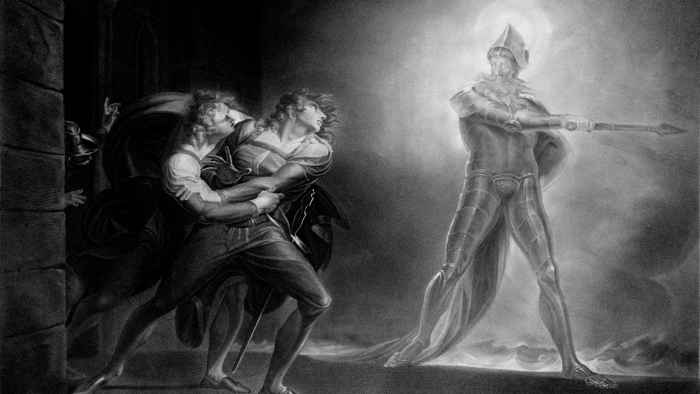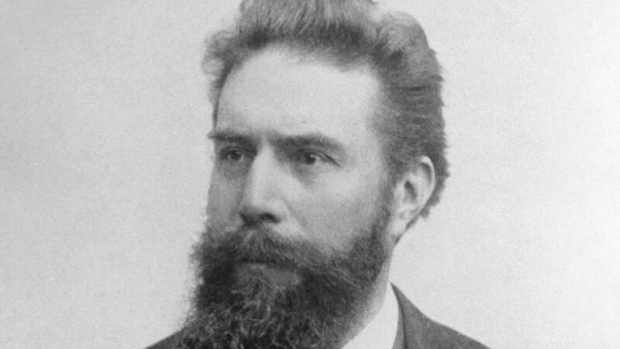Original Text, Summary & Analysis of Hamlet's Second Soliloquy

Hamlet begins his second soliloquy immediately after the Ghost of his father, who claims to have been murdered by King Claudius, exits the stage.
Hamlet's Second Soliloquy: "O all you host of heaven!"
In William Shakespeare's Hamlet, the titular character undergoes significant transformations through soliloquies, or self-addressed monologues. Below is the original text of Hamlet's second soliloquy, followed by a summary and analysis to help you understand it.
Soliloquy From Act 1, Scene 5 of Hamlet
O all you host of heaven! O Earth! What else?
And shall I couple hell? O fie! Hold, hold, my heart,
And you, my sinews, grow not instant old,
But bear me stiffly up. Remember thee?
Ay, thou poor ghost, whiles memory holds a seat
In this distracted globe. Remember thee?
Yea, from the table of my memory
I'll wipe away all trivial, fond records,
All saws of books, all forms, all pressures past,
That youth and observation copied there,
And thy commandment all alone shall live
Within the book and volume of my brain,
Unmixed with baser matter. Yes, by heaven!
O most pernicious woman!
O villain, villain, smiling, damnèd villain!
My tables—meet it is I set it down
That one may smile and smile and be a villain.
At least I am sure it may be so in Denmark.
[He writes.]
So, uncle, there you are. Now to my word.
It is "adieu, adieu, remember me."
I have sworn 't. (Hamlet 1.5.99–119)
Summary of the Second Soliloquy
In Act 1, Scene 5, the Ghost of Hamlet's father tells Hamlet that he was murdered by King Claudius, Hamlet's uncle. Before exiting the scene, the Ghost implores Hamlet to avenge his death and not to forget what he's been told: "Adieu, adieu, adieu. Remember me" (98).
The soliloquy that follows this conversation carries Hamlet's rage, grief and confusion. The prince invokes the greater cosmos—heaven, earth and, almost as an afterthought, hell—and asks that his body remain strong for what is about to happen. He refers to his head as a "distracted globe" (104) and hopes to wipe his mind of trivial facts and memories so that he may remember and live by his father's "commandment" (109).
Hamlet calls his mother the "most pernicious woman" (112) and his uncle a "smiling, damnèd villain" (113). He makes a mental note—"Within the book and volume of my brain" (110)—of the world's corruption, that people can deceitfully smile as they commit villainous acts. He is sure that such treachery is, at the very least, present in Denmark.
Hamlet, now seeing his uncle for what he truly is, echoes his dead father's words—"adieu, adieu" (118)—and vows to avenge his murder.
Analysis of Literary Devices
Now let's examine three important literary devices used in this soliloquy: consonance, metaphor and theme.
Consonance
In poetry, consonance is the use of repeated consonant sounds. Note the repetition of v, l and n sounds in line 113 (Robertson):
"O villain, villain, smiling, damnèd villain!"
These consonant sounds reflect the way Hamlet perceives his enemy. They "convey the snaky, suave, oily, sinister nature" of King Claudius (Robertson). The effect becomes quite clear when the line is read aloud with stress put on the consonance sounds.
Metaphor: The Mind as a Book
A metaphor is an implicit comparison between two things. Unlike a simile, a metaphor does not use the words "like" or "as." In the second soliloquy, Shakespeare creates a metaphor between Hamlet's mind and a book: "Within the book and volume of my brain" (110). This metaphor is extended when Hamlet commits his epiphany to writing: "My tables—meet it is I set it down" (114).
In clinging to this metaphor, Hamlet betrays his own "schoolboy mode of existence," suggesting that he is a "man of words, not action" (Robertson). Listening to his speech, one may suspect that Hamlet is in over his head and is not actually prepared to avenge his father's death. By overextending the metaphor, Hamlet overextends himself.
Recommended
Theme of Uncertainty
The theme of doubt and uncertainty runs through the soliloquy. Hamlet calls to the heavens and the earth to give him strength, a natural response to a traumatic event, but then he invokes hell, seemingly as an afterthought.
Hamlet, by appealing to both heaven and hell, reveals his uncertainty as to the moral nature of the situation. It is possible that the powers of heaven will not aid Hamlet in avenging his father, in which case "he may be forced to resort to the baleful demons of hell" (Schrickx, 243).
The Ghost's origins and identity are also uncertain. At this point in the play, Hamlet cannot know for sure whether the Ghost is truly that of his father or a malevolent impersonator. The ambiguity of the Ghost's identity will remain a problem throughout the rest of the play.
Fragmented Speech
Hamlet's fragmented speech, also called anapodoton, reflects his state of uncertainty. It is as if his mind is racing from one idea to the next, with thoughts being left unresolved or incomplete.
Examples of fragmented speech in the soliloquy include line 99 ("O all you host of heaven! O Earth! What else?") and lines 111–113 ("Yes, by heaven! / O most pernicious woman! / O villain, villain, smiling, damnèd villain!").
Works Cited
- myShespeare.me. "Adieu, adieu, adieu. Remember me." https://myshakespeare.me/quotes/remember-thee/
- Robertson, Rodney. "Hamlet Soliloquy 2: O all you host of heaven! (Act 1 Sc 5)." YouTube, uploaded by 5Quote Shakespeare, January 20, 2023.
- Schrickx, W. "The Background and Context of Hamlet’s Second Soliloquy." The Modern Language Review 68, no. 2, 1973, pp. 241–55.
- Shakespeare, William. Hamlet. The Folger Shakespeare. Ed. Barbara Mowat, Paul Werstine, Michael Poston, and Rebecca Niles. Folger Shakespeare Library. https://www.folger.edu/explore/shakespeares-works/hamlet/read/
Comments
cmarks on July 24, 2019:
I thought it would have line by line
Safaa on April 15, 2019:
I wanna them be explained line by line
Rabia on March 04, 2019:
Great information , everything is highlighted in this summary
Sayma on November 01, 2018:
Thank you so much
Mo on January 11, 2018:
Thanks a lot
James Z. on March 07, 2017:
This is Act 1 Scene 2
Rahma on March 06, 2017:
Thanks a ton!
I have my exams coming, and this helped a lot.
Amina Ahmed on October 28, 2016:
It's just helpful.
Rachel on November 16, 2015:
In my version of the play, at the end is says,
"So, uncle, there you are. Now to my word:
It is 'Adieu, adieu! Remember me.'
I have sworn't.
I'm not sure whether this was in the original or not, but this statement adds to the theme of revenge that is carried throughout the play.
Tiki M.A in Eng on May 24, 2015:
Its too much helpful to understand the whole play in brief.Thanks
Andy Cotts on June 15, 2014:
Yo much thanks
youg thugge on March 18, 2014:
this helped me pass my paper
Syed Hunbbel Meer (author) from Karachi, Pakistan. on August 14, 2011:
@Leni sands. Thank you for your comment. This series will contain all SEVEN SOLILOQUIES BY HAMLET. I hope you will like them all :)


